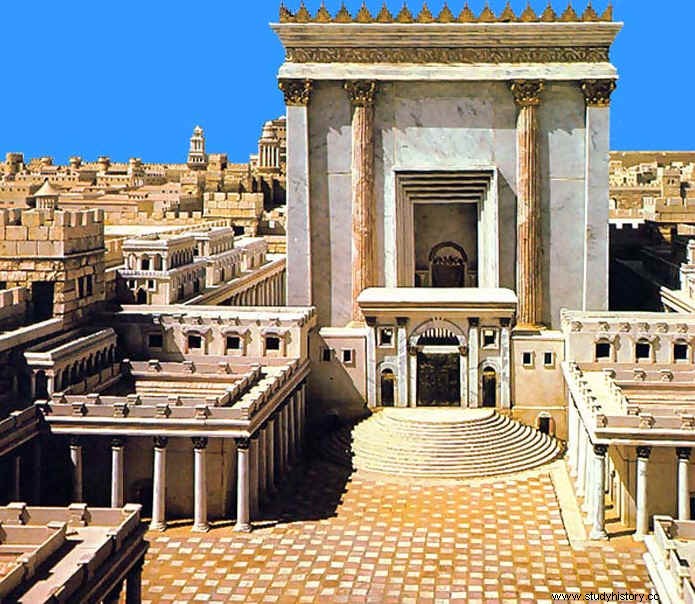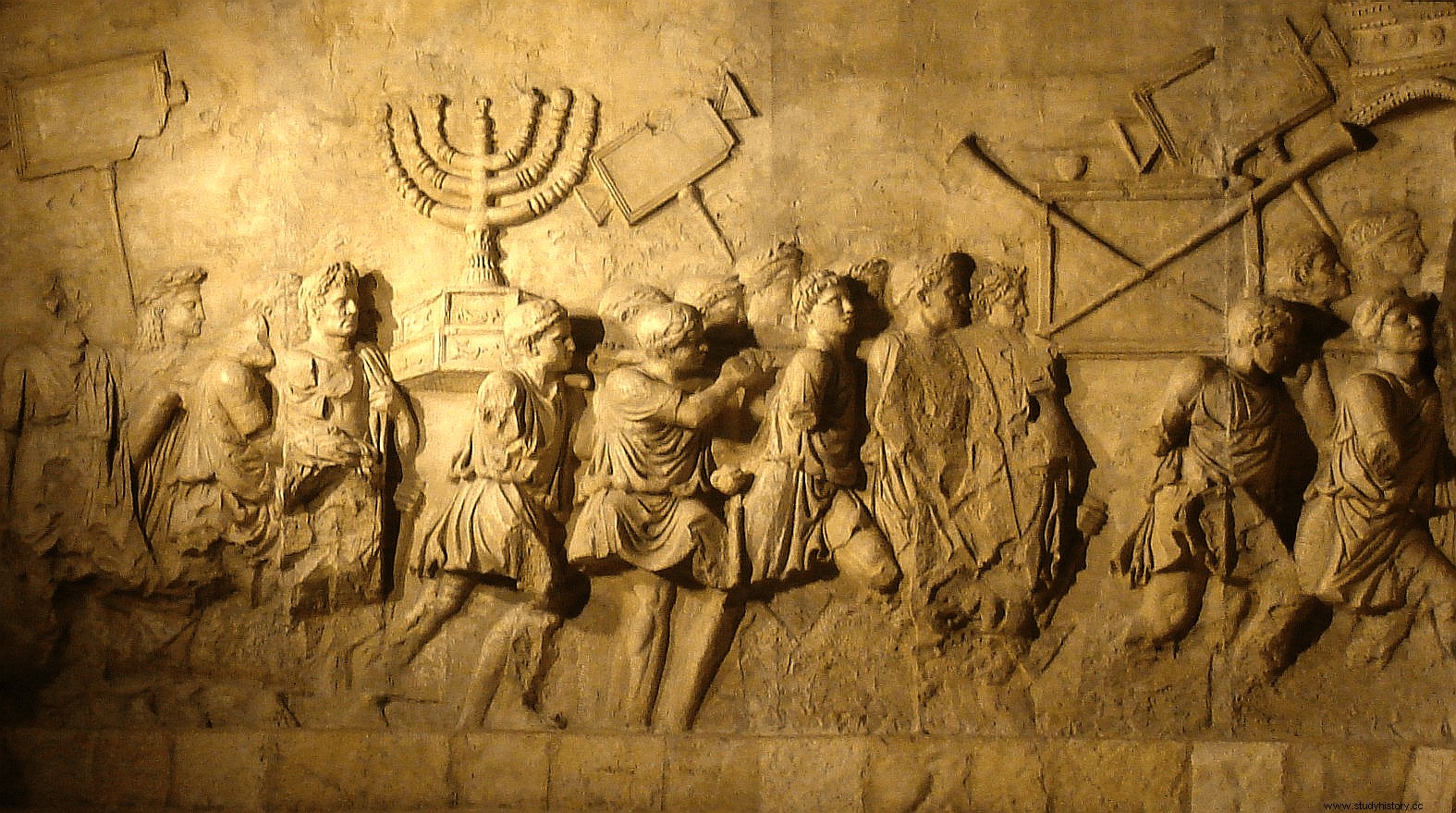Our archenemy today was one of the Jewish leaders who rebelled against Rome at the end of Nero's rule, causing the greatest physical, human and spiritual disaster that Jerusalem suffered in all of classical antiquity. His obstinacy and blind faith in his God led the people of Israel to one of the bloodiest episodes in its troubled history.
Twenty-ninth installment of “Archienemies of Rome “. Collaboration of Gabriel Castelló
In the year 66 of our era, being then emperor Nero , Jerusalem, and all Judea, rose up against Rome. But why did a hitherto bland and quiet province dare to challenge the most powerful state of its time? Let us understand the causes:Judea entered the Roman orbit in one of the successful campaigns of Pompeyo el Grande , in 63 BC After the reorganization of the Roman East, several puppet regents to the taste of the Republic, style Herod the Great and his inoperative descendants, governed the province under the supervision of a Roman prefect, leaving the Jews an alleged self-government that maintained their traditions, as long as the taxes set for the province were regularly contributed. That tense balance between religious tolerance and political acceptance was truncated at Easter in the year 66. According to what he has left us in his chronicles Flavio Josefo , Judeo-Roman historian participating in this story, the reasons for the revolt were the performance of a sacrifice to the gods before the Synagogue of Caesarea, an important port city of Judea with a large population of Greek origin, the theft of seventeen talents of gold intended for to the Temple by the procurator Gesio Floro and, perhaps for this reason, the decision of its maintainer, the son of the High Priest called Eleazar ben Hanania , not to perform any more sacrifices on it in honor of the emperor.

Jerusalem in the 1st century
Before the imminence of the outbreak of the revolt, the timorous Herod Agrippa II and his sister Berenice fled from Judea, seeking refuge in Syria, well equipped with the troops that Gaius Cestius Gallus , legate of the emperor in that province, was gathering on the coast ready to stop the uprising. After some early military successes of Gaul in the valley of Jezreel , he was unable to take Jerusalem with only the XII Fulminata . As he retreated to secure positions, he was surprised by Eleazar ben Simon in Beth-Horon . The massacre was important, since Gallo practically lost all his troops, about 6,000 men plus his baggage, having to flee ignominiously between hills and ravines until they reached Antioch. The gods deprived Nero of accountability for that disaster, because he died in Syria very shortly after, being replaced in office by Gaius Licinius Mucianus .
When news of that disaster reached Rome, Nero chose to entrust the matter to one of his most efficient legates, Titus Flavius Vespasian , the future emperor, who brought together under his command the remains of the XII Fulminata plus the V Macedonica , X Fretensis and the XV Apolinaris . Between regulars and auxiliaries, Vespasiano mobilized an amount of about 60,000 men. Entering the province from the north, he soon eliminated all resistance with such a human roller. His overwhelming advance forced two men at odds over internal Jewish affairs, Yohanan ben Levi , better known as Juan de Giscala , leader of the zealots , and Simon bar Giora , leader of the hitmen , they will fall back towards Jerusalem, hoping to resist in their holy city until the last breath. Both were true fans. John of Giscala He headed the Zealots, staunch enemies of everything foreign and therefore public enemies of the Roman Praetorium. For his part, Simón bar Giora He led the assassins along with other conjured assassins such as Eleazar ben Jair , the later hero of Masada , ready to kill any Jew who did not voluntarily join their revolt. Even the Talmud itself records how they blocked the city's supplies to force the population to join their revolution instead of negotiating peace with the Romans.
What they could not imagine Simón bar Giora and his was that the outbreak of civil war in Rome would paralyze Vespasian's campaign. After the violent death of Nero, there were major disturbances in the city, briefly occupying the purple dark and unscrupulous men such as Otho and Vitellius until, in 69, it was Vespasiano who prevailed among all that mess of intrigues and interests. For this reason, the new emperor left his son Tito in Judea in charge of putting down the revolt. An arduous task for a twenty-nine year old…
Faced with the impossibility of storming such a large and well-defended city, Titus chose to surround it, placing his four legions around it and preventing the hundreds of circumstantial pilgrims who were there during Easter from leaving the city. He thought that in this way there would be more intramural mouths that would force an agreed surrender. He didn't come out like that. The vengeful god of the Jews did not understand mercy. Thousands of people died in Jerusalem from famine and disease, while Simon Bar Giora and theirs kept at bay both the Romans and their countrymen who attended petrified each retaliation of the Zealots, throwing from the walls anyone who was prone to reaching an agreement with the Romans. The terror took posetion of the city. Both fanatics and starvation killed, as happened to the greedy high priest Ananias , inclined to agree to an armistice in which his fortune would not be in danger. Bringing him out of his hiding place, he was executed by the Zealots without the slightest consideration. Tito was still waiting; the garrison of Jerusalem was around 25,000 people, a part under the authority of the zealot Eleazar ben Simon occupying the Torre Antonia, another part under the sicario Simon bar Giora and a third part of the Idumean court under the direct control of Juan de Giscala . Any attempted assault would always take the Antonia tower first:it was an imposing fortress, built by Herod the Great in honor of his benefactor, Mark Antony, hence its name. While the Jews were decomposing in their internal troubles, Tito took out his four legions to form before the walls, frightening the sentinels with his might.
Trying to find a bloodless solution to the situation, the young legate turned to the services of Yosef bar Mattityahu , who later adopted the name of Flavius Josephus in honor of the nomen of the protectors of him. This was a pro-Roman Jew, much hated by the most radical elements of the revolt for his collaboration with Vespasian after the capture of Galilee, where he saved his life by predicting that he would be emperor. The fact is that Josephus entered Jerusalem as a parliamentarian and told Simón bar Giora and Eleazar bar Simon :
«May they and the people be saved, may they save their country and the temple» (War of the Jews V, 362); "God, who makes the empire pass from one nation to another, is now with Rome" (War V, 367); "Our people have never received the gift of arms, and for them to wage war will necessarily mean being defeated in it" (Guerra V, 399); «Do you believe that God still remains among his own who have become perverse?»
A hothead shot him with an arrow in response to his offer of surrender, and he had to be tended back to the Roman camp. Seeing the uselessness of trying to reach an agreement with the Jews, and even more so after a counterattack that almost cost him his life, Tito went into action. In the summer of 1970 he deployed a proactive siege of such magnitude that he managed to bring down the Antonia Tower with sappers. Simon bar Giora and his acolytes defended like wolves street by street, inch by inch, in a slow and bloody fight.

Model of the Solomon Temple
First the citadel fell, and soon after, the Temple was engulfed in flames by a brand that a legionnaire accidentally dropped there. The burning of Solomon's Temple marked the point of no return for the assault. It was a hot day in late August, a date still bitterly remembered by all Jews. The flames spread to other neighborhoods of the city and the legions had an expeditious step to eliminate the pockets of resistance led by Eleazar ben Simón , who died killing, and control the entire city. September 7 is considered the date on which Jerusalem was completely pacified.
The Senate wanted to give young Titus a crown for his victory, but he refused, saying:«there is no merit in defeating a people abandoned by their own God «. The result of the revolt was devastating. As Josephus quoted, about 1,100,000 Jews died in the four years of war, in addition to the 97,000 who ended up as slaves . All the sacred elements of Judaism, such as the Solomon's Table or the Seven Arms Chandelier they ended in the triumphal parade of the future emperor, beginning a legendary route whose trail was lost after the Arab conquest of Hispania. Not only treasures were exhibited, Juan de Giscala and Simon bar Giora they also paraded in the Triumph; the former died in the dungeons, while his partner in revolt had a quicker and easier ending. At the end of the parade, he was thrown from the Roca Tarpeya , the ancestral place from which he executed the worst enemies of Rome.

